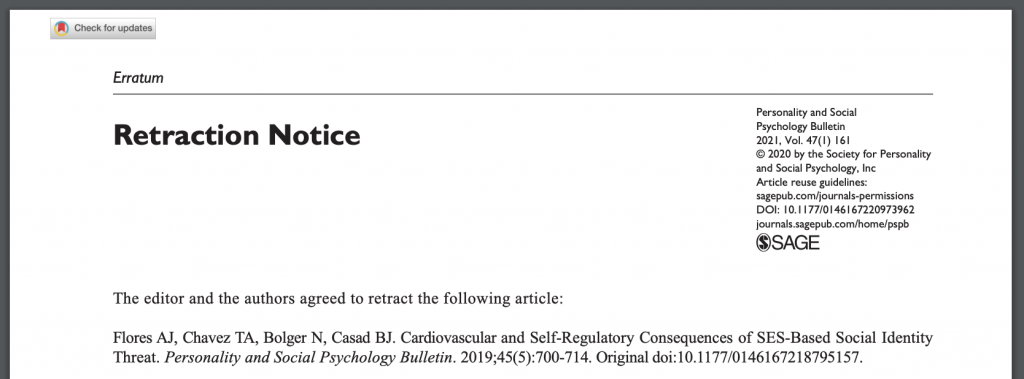
Personality and Social Psychology Bulletin has retracted a 2018 paper because, according to a retraction notice, the first author changed data in a way that “resulted in incorrect and misleading results.”
The article, “Cardiovascular and self-regulatory consequences of SES-based social identity threat,” claims to show that socioeconomic status-based “social identity threat can go from ‘in the air’ to ‘under the skin’ to influence physiological and self-regulatory processes.” It has been cited twice in addition to the retraction notice, according to Clarivate Analytics’ Web of Science.
Here’s the retraction notice:
This article is being retracted at the request of all of the authors. The first author of the paper, Abdiel J. Flores, contacted the journal on his own initiative to inform it that he falsified data in the paper. He altered specific data values in Figures 1 and 2 and associated analyses that resulted in incorrect and misleading results on the effects of SES identity threat on cardiovascular challenge/threat reactivity and on mathematics performance. Because this data manipulation invalidates the findings, the entire article is being retracted. Mr. Flores informed the journal that he takes full responsibility for alteration of data; none of the co-authors participated in or had knowledge of the first author’s actions. Mr. Flores self-reported this matter to his institution, Columbia University, which is handling it in accordance with institutional policy and procedure.
Flores, who was awarded a Undergraduate Research Grant to Promote Diversity in Health-Related Research by the National Institutes of Health (NIH) for the work, did not respond to a request for comment.
Asked about the status of Columbia’s investigation, and whether the university had made any findings, research integrity officer Naomi Schrag forwarded our request for comment to the university’s public affairs office. Vice president for public affairs Scott Schell said he “can confirm that the investigation you’ve asked about has been completed.”
Schell did not respond to follow-up questions about the findings and whether Flores was still enrolled as a graduate student.
Like Retraction Watch? You can make a tax-deductible contribution to support our work, follow us on Twitter, like us on Facebook, add us to your RSS reader, or subscribe to our daily digest. If you find a retraction that’s not in our database, you can let us know here. For comments or feedback, email us at [email protected].
I wonder why would the graduate student confessed himself and take all the responsibility suddenly, but that’s unfortunate.
It might be similar to when a company allows a person to “resign” to save face rather than being fired (e.g., Cleta Mitchell). But we’ll never know, I guess.
Circa May 2021 this guy still seems to be at Columbia, so no substantive action seems to have been taken.
Very Lucky, maybe by contacting the Journal on his on initiative is what saved him?